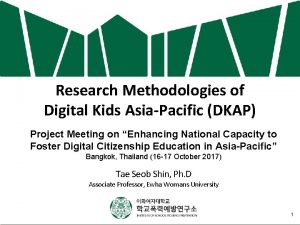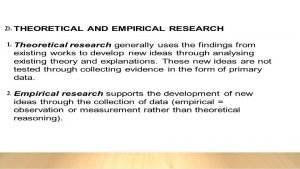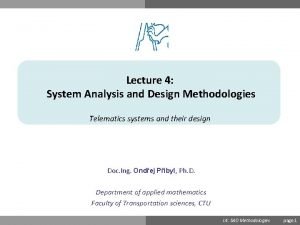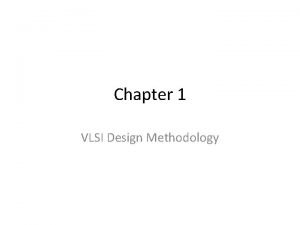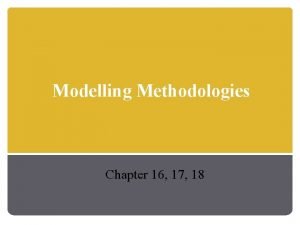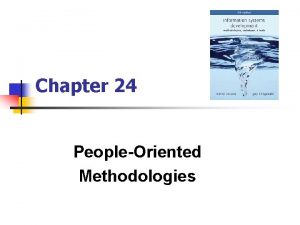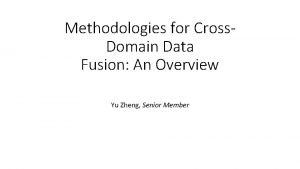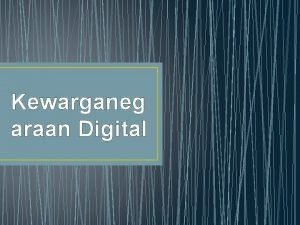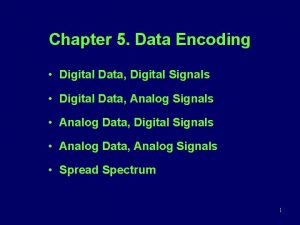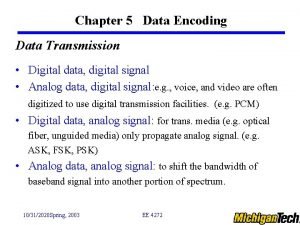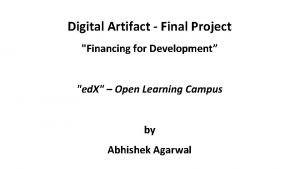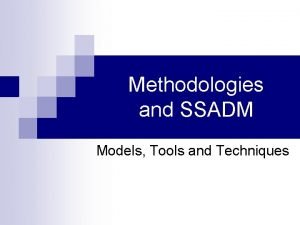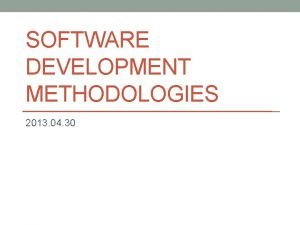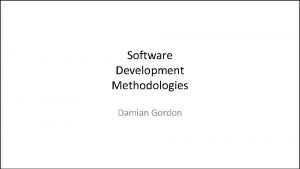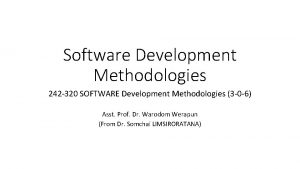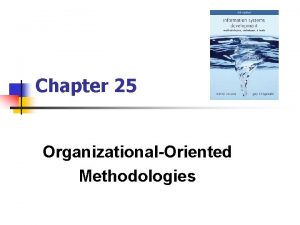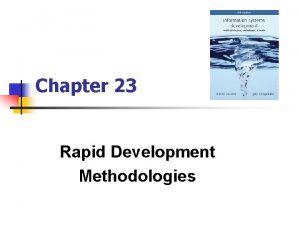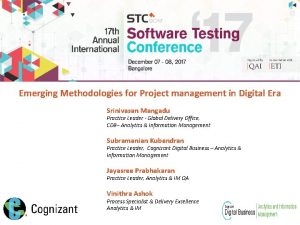Research Methodologies of Digital Kids AsiaPacific DKAP Project























- Slides: 23

Research Methodologies of Digital Kids Asia‐Pacific (DKAP) Project Meeting on “Enhancing National Capacity to Foster Digital Citizenship Education in Asia-Pacific” Bangkok, Thailand (16 -17 October 2017) Tae Seob Shin, Ph. D Associate Professor, Ewha Womans University 1

Overview v Overview of DKAP v Introduction of Research Teams v Competency Framework v Timeline v Discussion

DKAP (Digital Kids Asia Pacific) Project ㄱ 3

Overview of DKAP “The overall aim of the research team is to conduct a comparative cross‐national study to address the Asia‐Pacific region’s knowledge gap regarding children’s ICT practices, attitudes, behaviors, and competency levels within an educational context” To achieve the goal, we perform the following tasks: ㄱ ü ü Assessment development (A paper‐based survey) Data collection (pilot tests) Data analysis and synthesis Collaboration with country research teams & UNESCO Bangkok team 4

Research Teams Lead Research Team ü Republic of Korea ü Institute of School Violence Prevention (ISVP) at Ewha Womans University Country Research Teams ü ü Thailand Vietnam Bangladesh Fiji 5

Institute of School Violence Prevention ㄱ (ISVP) Seoul, Republic of Korea 6

Institute of School Violence Prevention (ISVP) Aim and History Ø A professional research institute dedicated to promoting safe school environment through engaging in the design, implementation, and evaluation of program and policy for school violence prevention and intervention Ø Established under the College of Education at Ewha Womans University, Seoul, Republic of Korea, in 2012 and financially supported by the Research 7 Grant from National Research Foundation of Korea for 9 years.

Institute of School Violence Prevention (ISVP) Works Ø A number of studies related to school violence prevention and intervention has been conducted using various research methods including quantitative (e. g. , survey) and qualitative (e. g. , focus group interview) methods • Longitudinal Study on School Violence Study • Policy Evaluation • Development of Educational Intervention Program Ø We have expanded research scope to international level by forming a research network with domestic and international professionals • International Symposium on School Violence and Bullying: From Evidence to Action (January, 2017) 8

Institute of School Violence Prevention (ISVP) Team Members Ø ISVP team consists of a group of researchers who have expertise in the areas of Digital Education, Educational Policy, and Educational Psychology and Evaluation. 친구만족도로 규정하고 각각의 영향력에 대해 다항로지스틱 회귀분석을 통해 확인하였다. . 선 Educational Policy Digital Education 행연구를 Dr. 바탕으로 You학교폭력 Kyung피해·가해 경험에 영향을줄 것이라고 판단되는 요인을 성차, 학년, 그리고 가족·학교·친구만족도로 규정하고 각각의 영향력에 대해. Han (Director) Dr. Jae Young Chung Dr. Mi Suk Sun Dr. Kyu Yon Dr. Tae Seob Shin Dr. Hyeyoung 9

ISVP’s Role in the Project Assessment Development ü Finalize the Digital Citizenship Competency Framework ü Develop the assessment tool (A paper‐based survey) for measuring children’s attitude and behaviors, competency levels, and use of ICT Pilot Test – Data Collection ü Support the pilot countries (Thailand, Vietnam, Bangladesh, and Fiji) in the pilot test ü Data collection in South Korea ü Merging data from five countries Data Analysis ü Compare the status of the pilot countries using the Digital Citizenship Competency Framework and synthesize the findings 10

Korean Samples ü Nationally representative sample: A minimum of 1, 500 lower secondary aged children (12‐ 14 years old) ü Two‐stage stratified sampling: 1. Schools will be selected systematically from national list of all eligible schools • Approximately 30 schools will be selected • Grade level, region, degree of urbanization, etc. will be considered 2. Students will be sampled: • Per school, a sample of approximately 50 students will be randomly selected 11

Expected Country Team’s Roles Assessment Development ü Review and provide feedback on the framework and methodologies Pilot Test – Data Collection ü ü ü Translate English‐written assessment into own language Test the translated assessment Select national representative sample according to ISVP’s guideline Conduct a pilot test (data collection) Conduct data coding according to ISVP’s guideline Data Analysis ü Review and provide feedback on ISVP’s synthesis of the findings 12

DKAP Competency Framework ㄱ 13

Digital Citizenship Competency Framework ü Conference on Digital Citizenship Education in Asia‐Pacific (March, 2017) • Initial framework was developed ü Experts’ Meeting (July, 2017) • Framework was refined with a final set of five domains together with the corresponding competencies and sample performance indicators Digital Literacy Creativity & Innovation Digital Emotional Intelligence Digital Safety & Resilience Digital Participation & Agency 14

Digital Citizenship Competency Framework ü All competencies identified/suggested should be measured? • The unique and qualitative nature of the competencies identified cannot be easily measured • Transversal nature of competencies in a domain: Each competency is highly correlated • Children’s cognitive burden should be considered ü Need for finalizing the (core) competencies that should be measured in this project and their performance indicators with a focus on consistency, clarity, and validity ü Initial core competencies of each domain were selected based on the literature review of prior research 15

Core Competencies in Each Domain Digital Literacy 1. ICT Literacy: Managing and operating ICT hardware and software responsibly in digital environments to access and search for data, information and content, and to utilize them. 2. Information Literacy: The ability to seek, critically evaluate and use digital information effectively to make informed decisions. Sample Item How well does the following statement describe you? (Darken only one . 친구만족도로 규정하고 각각의 영향력에 대해 다항로지스틱 회귀분석을 통해 확인하였다. . 선 circle): 바탕으로 I am able to copy and move file or folder 행연구를 학교폭력 피해·가해 경험에a영향을줄 것이라고 판단되는 요인을 성차, 학년, 그리고 가족·학교·친구만족도로 규정하고 각각의 영향력에 대해. Very much like me Mostly like me Somewhat like me Not much like me Not at all like me 16

Core Competencies in Each Domain Digital Safety & Resilience 1. Personal Data, Privacy and Reputation: To understand how to use and share personally identifiable information while being able to protect oneself and others from harm. Be able to implement strategies for information and device security and personal security protocols. 2. Promoting and Protecting Health and Well‐Being: Ability to identify and manage health risks, and use digital technology in order to protect and improve the physical and psychological well-being of oneself and others. 17

Core Competencies in Each Domain Digital Participation & Agency 1. Interacting, Sharing and Collaborating: The ability to interact, share data and information, and collaborate with others using suitable digital technologies to achieve shared goals (work, social, leveraging network, education, entertainment, etc. ). 2. Civic Engagement: The ability and willingness to recognize seek, and act on opportunities to positively influence local and global communities online and/or offline through appropriate digital technologies. Sample Item How well does the following statement describe you? (Darken only one. 친구만족도로 규정하고 각각의 영향력에 대해 다항로지스틱 회귀분석을 통해 확인하였다. . 선 circle): I use ICT to discuss political and social issues with other people 행연구를 바탕으로 학교폭력 피해·가해 경험에 영향을줄 것이라고 판단되는 요인을 성차, 학년, online 그리고 가족·학교·친구만족도로 규정하고 각각의 영향력에 대해. Very much like me Mostly like me Somewhat like me Not much like me Not at all like me 18

Core Competencies in Each Domain Digital Emotional Intelligence 1. Self‐Regulation: Ability to manage one’s emotions, moods and impulses during online engagements. 2. Interpersonal Skills: Build positive online relationships to communicate, build rapport and trust, embrace diversities, manage conflicts and make sound decisions. Sample Item In past year, have you ever build rapport or nurture positive relationships. 친구만족도로 규정하고 각각의 영향력에 대해 다항로지스틱 회귀분석을 통해 확인하였다. . 선 through online engagements? (Darken only one circle) 행연구를 바탕으로 학교폭력 피해·가해 경험에 영향을줄 것이라고 판단되는 요인을 성차, 학년, 그리고 가족·학교·친구만족도로 규정하고 각각의 영향력에 대해. Very often sometimes rarely never 19

Core Competencies in Each Domain Creativity & Innovation 1. Creative Literacy: Apply skills & use tools to create/adapt &/or curate digital content. 2. Problem Diagnoses & Solving: Ability to assess needs & challenges, synthesize knowledge, harness digital & other resources to design solutions. 20

Timeline (Draft) ㄱ 21

Phase 1 Conduct Data Collection Phase 2 ㄱ Phase 3 Phase 4 22

Questions on DKAP Point of Contact Ms. Hyeyoung Hwang, Ph. D Research Professor Institute of School Violence Prevention Ewha Womans University hye. hwang@ewha. ac. kr 23
 Dkap
Dkap Kids r kids west cobb
Kids r kids west cobb Types of methodologies
Types of methodologies System analysis and design methodologies
System analysis and design methodologies Modularity in vlsi
Modularity in vlsi Agile methodologies wiki
Agile methodologies wiki Define the relationship chapter 16
Define the relationship chapter 16 People oriented methodologies
People oriented methodologies Domain closure in software testing
Domain closure in software testing Indigenous methodologies
Indigenous methodologies Business performance management methodologies
Business performance management methodologies Methodologies for cross-domain data fusion: an overview
Methodologies for cross-domain data fusion: an overview Hukum digitalmengatur tentang
Hukum digitalmengatur tentang Digital markets and digital goods
Digital markets and digital goods Digital data digital signals
Digital data digital signals Data encoding and modulation
Data encoding and modulation E-commerce: digital markets, digital goods
E-commerce: digital markets, digital goods Digital data to digital signal encoding
Digital data to digital signal encoding Luxinnovation logo
Luxinnovation logo Unique features of digital markets
Unique features of digital markets Digital michelangelo project
Digital michelangelo project Kari pulli
Kari pulli Science fair quotes
Science fair quotes Digital artifact project
Digital artifact project
